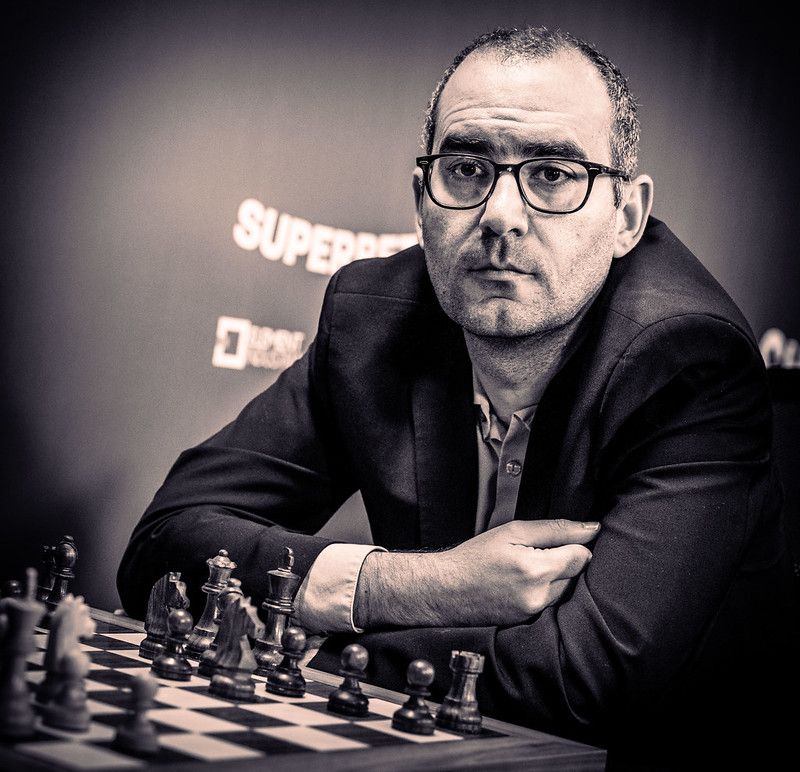
Aronian's Great Escape: 2022 Superbet Chess Classic Romania, Day 8
The eighth round of the Superbet Chess Classic, which was played on the notorious Friday the 13th, delivered just as much blood as the history annals would have us believe that was spilled on the days with that date. At the end of it there was only one winner when GM Leinier Dominguez benefitted from yet another mistake by GM Shakhriyar Mamedyarov, who just cannot make things work right in this event.
The other games were played out until there was absolutely no winning potential or even winning material left on the board. The biggest story, however, was GM Levon Aronian's study-like draw escape against GM Ian Nepomniachtchi. Much more about that is below.
With the above developments in mind, the standing after eight rounds have GMs Levon Aronian and Wesley So continue to share the lead, now with 5/8, still chased only by GM Maxime Vachier-Lagrave on half a point. The main peloton is a further half point behind.
Round nine will begin an hour earlier than the previous rounds, on Saturday, May 14, at 4 a.m. PT / 13:00 Central Europe. The early start is to accommodate the situation where two or more players have to participate in a play-off to decide the winner of the event.
How to watch?
You can follow the 2022 Grand Chess Tour with Chess.com commentary on Chess.com/TV or on our Twitch channel. You can also catch all our live broadcasts on YouTube.com/ChesscomLive.
Follow the 2022 Superbet Chess Classic Romania games live on our dedicated page on Chess.com/events.
With the amount of excitement produced in just about every round of this event, it can almost make you forget those events where the top players are playing one uninspired, and bloodless draw after the next. Here in Bucharest, even on the days with four draws and just one win, and most days have been like that, you never feel like you did not enjoy yourself or were not entertained. The eighth round delivered fights and delights, triumphs and tearjerkers, and anything else that a chess fan's heart might desire.
Local hero GM Bogdan-Daniel Deac has thus far had a topsy-turvy but overall excellent event. He capitalized on a complete collapse by GM Richard Rapport to put him in the plus column, but when he had a collapse of his own a couple of rounds ago, he returned to the 50 percent mark—not bad at all in this company. Deac is establishing himself as a player who is bound for greater things in the future.
In Friday's round, he faced Vachier-Lagrave, who recovered nicely on Thursday with a win of his own after another miscalculation by Rapport. The French GM, starting the round just half a point behind the leaders, obviously would love a win against the player who is supposedly the weakest participant in the field, irrespective of his results thus far.
With the white pieces, he did not feel the urge to make another experiment with 1.d4 and returned to his true and tested favorite 1.e4. In response, Deac opted for a Petroff, undoubtedly after having checked Vachier-Lagrave's curious experiment with an early Nd3 in round one.

In this game, White followed well-explored paths until his 11.Be3, which was a departure from the main line, 11.Nc3, seen in two of Vachier-Lagrave's own games and a game from last year's world championship match.
Deac was anything but shaken up and equalized effortlessly. When approaching the time control, with plenty of time left on the clock, he expertly navigated Vachier-Lagrave's attempts to complicate and instead got the majority of the pieces exchanged.

After the time control, Deac steered the game into a simple rook ending that was easily drawn.
A very solid effort by the young Romanian. In the post-game interview, he was asked how he planned to approach the last-round game against GM Fabiano Caruana. "Play well," was Deac's perfect response. It is hard to fault his logic.
Speaking of Caruana, he played the white pieces against tail-ender Rapport, who undoubtedly would like this event to end to get home and prepare for his next two events: Norway Chess, which starts at the end of the month, and the Candidates tournament, which will start in Madrid on June 16. A busy program, particularly when you are not playing as well as you would like.

In a Sicilian Four Knights, Rapport decided to go for the same line he had used against GM Alireza Firouzja earlier in the event. He then played a different version of it on move eight, entering a line that Caruana had faced in the FIDE Grand Swiss in Riga last year. It was that tournament that gave Caruana and Firouzja each a spot in the upcoming Candidates tournament.
Despite getting excellent chances in that game, Caruana instead went for the main line, 9.c4, which leaves White with an apparent massive space advantage. However, general praxis has shown that Black has good counterchances.
After Rapport's 13...Qb5?, his position went from somewhat passive to miserable and very passive. Caruana then struggled a bit to find a setup that he liked and his advantage started slipping a bit.

It was, however, only after Caruana’s 24.Qxa6? that Black managed to equalize but even so only by a hair and two precise moves. It still looked like that only White could be better and that is possibly what had lured Caruana into this particular continuation.
Black’s counterplay, however, was just exactly sufficient for Rapport to hold the balance. Eventually, the remaining material got exchanged and a drawn ending emerged.
Dominguez posted his first win two rounds ago when he managed to fight back from an inferior position against Deac. In this round, he faced Mamedyarov, who won in round seven after a roller-coaster game where Nepomniachtchi missed an outright win.
In yet another Queen’s Gambit Accepted, Mamedyarov tried the 7.b3 variation that has been played exclusively by White in this event. As usual, Dominguez showed great preparation and equalized smoothly. In the middlegame, the players slowly but surely exchanged the pieces, seemingly indicating that both would be okay with the apparent, upcoming draw.

However, Mamedyarov got a little ambitious despite the piece distribution looking like appearing to be marginally favoring Black. The absence of a supporting square for the knight may have emboldened Mamedyarov, who started pushing his kingside pawns forward, chasing the knight but also accepting that both kings would become somewhat vulnerable.
This seemed like a risky decision as it is well-known that the attacking power of a queen and knight is normally considered superior to that of a queen and bishop, in the present case even more so because the bishop was sidelined on c4, not really doing much.
Yet, it was only just before the time control that the balance of the game started tipping, and it was primarily in Black’s favor. This disadvantage took firmer shape when on move 39 when it became clear that White’s king was much more vulnerable than his counterpart.

As we have seen in several games in this event, the moves immediately following the time control have been the most fertile ground for game-ending blunders. This game proved to follow that exact pattern when Mamedyarov’s queen started chasing a Fata Morgana in the pursuit of Black’s king, but suddenly it emerged that that king was perfectly safe while White’s king could not be defended.
A few moves later, White had to throw the towel in the ring, propelling Dominguez forward to the middle of the field on 50 percent whereas Mamedyarov returned to the bottom of the tournament table, where he has spent the majority of his time in this tournament.
In great spirits after his excellent win against Dominguez in round seven, Firouzja announced his intention of playing to win against So, even if playing with the black pieces. So, on his turn, mentioned after the game that it had been a little difficult to prepare against Firouzja because there had not been any recent games at any time control nor even online.
As Firouzja had used the King's Indian against Deac earlier in this tournament, he had taken some time to look at that opening and expressed that there were many lines that looked very good for White when analyzing them with an engine.
However, when you sit at the board, it is an entirely different experience and in the end, So decided to opt for something unbeatable, the Classical Exchange Variation, which clearly frustrated the French number one.

After precise play from both sides, the pieces were systematically exchanged, and eventually, the unavoidable draw became a reality. Not the most exciting game, but that is what can happen when you announce that you will try to beat So. He is not going to make it easy for you.
Last year's world championship challenger and this year's world championship candidate Nepomniachtchi has had some problems in this event. Most of them, however, have seemed entirely self-inflicted due to playing too fast and too sloppily when the situation called for patience and careful consideration. In round eight, it cost him a missed win and then later a draw against Mamedyarov.
Aronian has had quite the opposite experience, winning some good games and having chances for more in some, as well as quite a bit of luck in one, against Firouzja. Going into the round, he shared first place with So and his objective was obviously not to lose and hopefully stay on pace with So, depending on the result in So's game vs Firouzja.
Nepomniachtchi chose the current favorite choice against 1...e5, the Italian Game, an opening Aronian has spent considerable time defending against in his recent games, both here in Bucharest and in his preceding event, the American Cup in St. Louis a few weeks ago.
The players followed Nepomniachtchi-Mamedyarov until move 11 when Aronian chose to capture on d3 instead of Mamedyarov's 11...Kh8. This is not a new line for Aronian, having played it previously against both Vachier-Lagrave in 2019 and against Dominguez last year. The Russian grandmaster avoided playing into those games by opting for 15.Qe4. Aronian eventually went entirely away from previous praxis when playing 16...Be7 which seems to equalize, except not the way Aronian followed up as his 17th move was an inaccuracy, apparently giving White the initiative.
Aronian then chose to force his way into an endgame where he was defending with rook and five pawns vs bishop, knight, and four pawns. In the post-game interview, he said should have been fine if he had played carefully.

In the game continuation, both players played at a pace where you would suspect them of having to catch a train somewhere. The train, however, was not there and therefore this hurried play seemed completely irresponsible.
Rather than holding the balance, Aronian allowed Nepomniachtchi to make progress, and after 33...c6??, which gave White the opportunity to play b4-b5 and a few moves later put the pawn on b6 where it became a serious headache for Black.
But as Nepomniachtchi has done several times before, he too played too fast, letting Aronian almost entirely off the hook. But undeterred, Aronian played some further quick moves and managed to get himself rehooked after not finding the right way to eliminate the pawns on the kingside. Too late, Aronian started putting some serious thinking into the game, yet White seemed to cruise toward victory.
But that was when Aronian started making magic, first tempting White to win the g6-pawn when the b7-pawn was the actual prize horse. Immediately after, Nepomniachtchi failed to properly account for Black being threatening to slip into a draw fortress—despite an extra piece, White would not be able to win. It was the same ending that GM Sam Shankland failed to notice when he resigned a drawn endgame against GM Anish Giri in Wijk aan Zee 2019.

The same endgame did not appear on the board here, but the threat allowed Aronian to escape in an even more miraculous fashion than in his game against Firouzja. If there was ever a clearer reason to work on endgame studies I have not seen it. A brilliant save by Aronian; a further heartbreak for Nepomniachtchi.
Round 8 Standings

All Games Round 8
Previous coverage:
- Wins For Firouzja, Mamedyarov, Vachier-Lagrave: 2022 Superbet Chess Classic Romania, Day 7
- Aronian Wins Miniature, Joins Lead: 2022 Superbet Chess Classic Romania, Day 6
- Caruana Strikes: 2022 Superbet Chess Classic Romania, Day 5
- Wesley So Wins Again, Takes Lead: 2022 Superbet Chess Classic Romania, Day 4
- Deac Beats Rapport, Joins Lead: 2022 Superbet Chess Classic Romania, Day 3
- Nepomniachtchi Beats Firouzja: 2022 Superbet Chess Classic Romania, Day 2
- Wesley So Wins And Leads: 2022 Superbet Chess Classic Romania, Day 1
- 2022 Grand Chess Tour: All The Information


